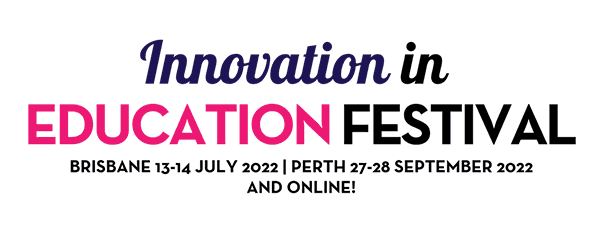
Contact MLC
Reception
+61 (08) 9384 4000Admissions
+61 (08) 9383 0269
2022 Innovation in Education Festival

Innovation in education is essential if we wish to set our students up for success in a world where change is the only constant. But where do we start? How can we foster pockets of innovation and risk-taking within an over-crowded curriculum? From my experience at MLC, this starts by pondering two concepts at the heart of all learning: questions and answers.
Let’s start at the end. An answer that ends a process of inquiry is a well-defined resolution; something that can be put neatly in a box in your mind and stored away on one of the shelves of your mental library. You may not like the answer, but it has a solidity to it. It rings with a sense of yes/no, right/wrong that helps reinforce your view of where you stand in the world and in relation to others. In short, answers tend to be comfortable.
Questions, on the other hand, are not comfortable. They are risky, unsettling and can be hard to pin down, their ephemeral tendrils stretching in all directions. Questions may refer to material new to the questioner, but already (and perhaps boringly) familiar to others; but for the questioner, there is the excitement of treading new ground for themselves, even if not new ground for humanity.
The asking of questions is critical to innovation, and relies on an old adage of brainstorming: all questions are valuable. To foster innovation in our students, we need to nurture environments that value questions and the exploration of them. As we encourage our students to question, we must also find the courage in ourselves to let them question us and the curriculum; to pay these questions the respect they deserve, we need to understand the why, the purpose, of our own teaching practice.
Through questions come an understanding of different perspectives and possibilities. To borrow from Antoine de Saint-Exupéry, what appears like a stack of rocks to one person is a cathedral to another. It is in the space between these different perspectives that innovation lies, drawing inspiration and insight from both.
So how does this relate to my everyday work as an Economics teacher and Director of Academic Operations at MLC? It’s all about mindset: moving away from the silos that have traditionally organised school and tertiary education, and deliberately finding opportunities to draw links between different areas. Consider, for example, how the design of computer games draws on the science and language of coding, but also storytelling and visual arts to provide a compelling context, perhaps with historical references, and finally geography and economics to create sustainable in-game systems.
For students at MLC, this thinking has led to the creation of innovation programmes whereby students in Years 6 to 10 have opportunities to explore real-world problems through a design thinking framework. This has real-world results, with students pitching their ideas to their peers, to College Leadership and to prominent companies. This empowers our students to understand the impact of their voices and ideas, on topics ranging from reducing paper use at the College to improving teenage experiences of mental health support.
It all starts with questions, leading to inquiry, leading to more questions and more inquiry. At any step, the journey could be derailed by a multitude of factors; but if we (and our students) deliberately seek out and value questions, we are creating space for innovation.
Events such as the upcoming Innovation in Education festivals and webinars are a marvellous way to learn about the questions being asked and explored by a wide range of people involved in the education sector. They are also an opportunity to connect with your own questions, to play with them, contemplate them and learn from them.
Millions saw the apple fall, but Newton was the one who asked why. – Bernard Baruch
Vanessa Smith, MLC Director of Academic Operations